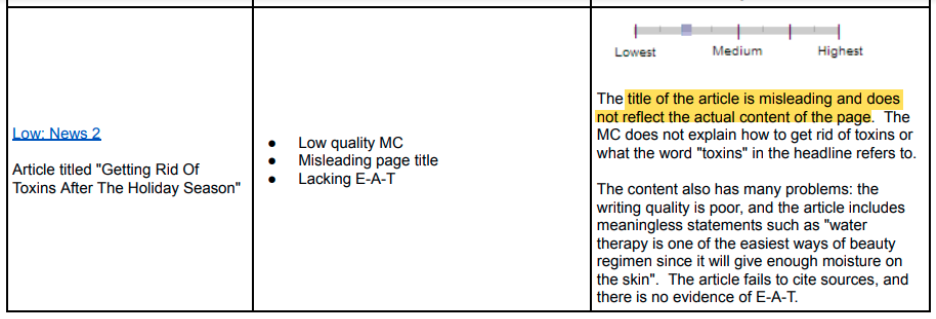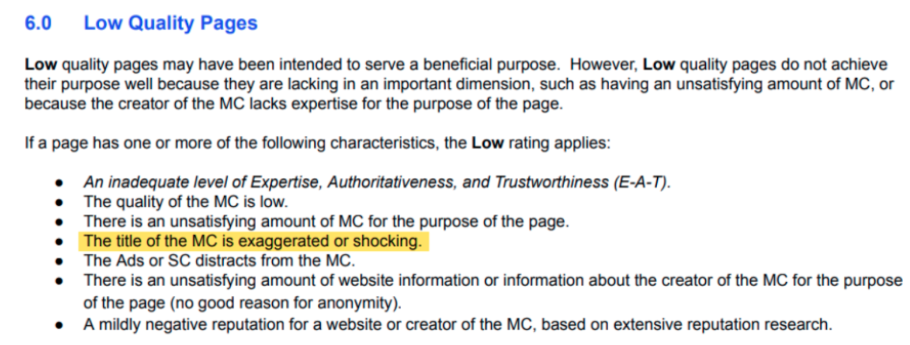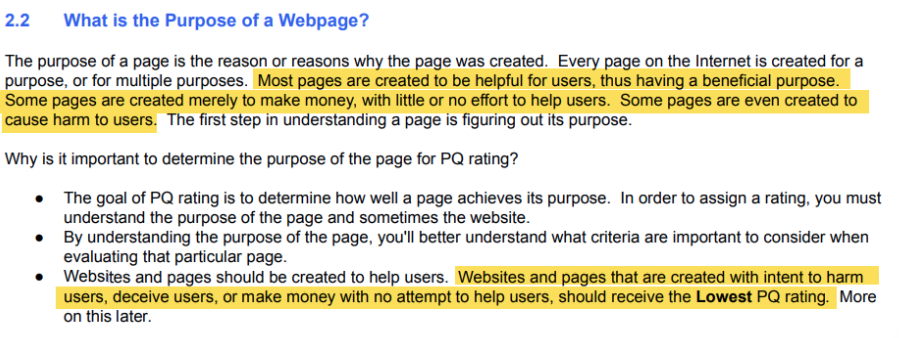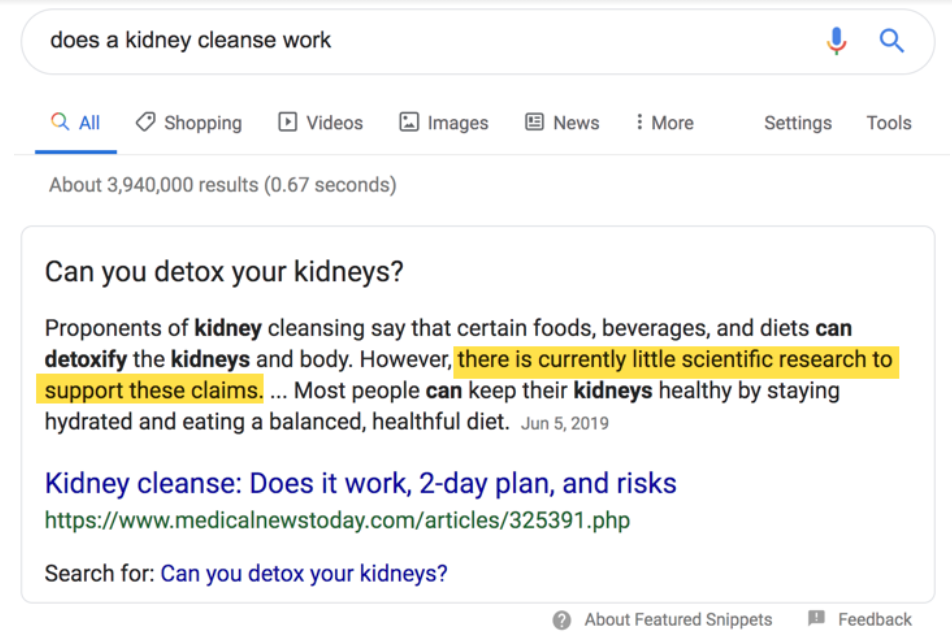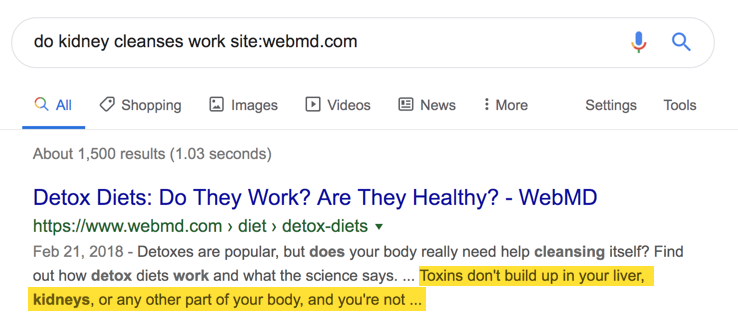Table of Contents
- Is Google suppressing sites that contradict scientific consensus?
- What do the Quality Raters Guidelines (QRG) say about scientific consensus?
- How could Google measure scientific consensus?
- Does Google use a “trust score” in quality assessments?
- Are health pages considered untrustworthy if they are selling a product?
- What can be done to recover?
- Conclusions
Is Google suppressing alternative health sites? How Google could measure scientific consensus.
Is Google suppressing health sites that contradict scientific consensus? We think they are! In this article we will discuss our thoughts on why this is happening, how Google is accomplishing this, and also what you can do to improve your website so that this change to Google’s core ranking algorithm does not cause issues for your business.
The last year has been challenging for most health sites that rely on Google organic traffic for income. We saw many health sites see big traffic drops with the medic update on August 1, 2018. Not long after that, on September 27, 2018 there was another significant update. At MHC, we felt that this update indicated a strong attempt by Google to make it so that sites with serious trust issues did not rank well.
Those two big Google updates happened shortly after Google made changes to their Quality Raters’ Guidelines. One of these changes was that they added the words, “safety of users” in a few places:
June 3, 2019 was the date of another significant core quality update. In our post on this update, we speculated that this core algorithm update was, amongst other things, going to suppress websites that had information that contradicted scientific consensus. From what we have seen so far, this likely is exactly what has happened. While not every site that dropped June 3 is a medical site that contradicts scientific consensus, a huge number of sites that did drop fall into this category.
We believe that many, if not all, of the following drops in traffic, as estimated by SEMRush, have happened because of Google’s attempts to devalue sites that potentially contradict scientific consensus. Each of these health sites below had a massive drop in conjunction with the June 3 core update.
Mercola
Mind Body Green
Examine
Dr. Axe
There are many, many more as well.
What do the Quality Raters Guidelines (QRG) say about scientific consensus?
We have written extensively in the past about the importance of Google’s Quality Raters’ Guidelines. While these guidelines don’t tell us exactly what is in the algorithm, Google’s VP of search, Ben Gomes has told us that the guidelines show us fundamentally what Google wants their algorithms to do. We believe that if something is in the QRG, it is a strong hint for us, telling us what it is that Google considers high quality.
The Quality Raters are told that it is a sign of low quality if a website has information that contradicts scientific consensus. In order for a page on a scientific topic to be seen as high quality, it must “represent well-established scientific consensus on issues where such consensus exists.”
And again, in order for an informational page to be considered high quality, it must be “supported by expert consensus where such consensus exists”.
The raters are given examples of characteristics of high and low quality pages. We’ve highlighted below that it is to be considered as “potentially misinforming users” if a page has YMYL content that contradicts well established expert consensus.
This section in the QRG, on pages that potentially misinform users, is very important. Quality raters are instructed to label a page as “lowest quality” if there is content that is “demonstrably inaccurate” or if there is YMYL content that contradicts scientific consensus.
It is interesting to note that in the screenshot above, one of the examples given of a site that could be seen as contradicting scientific consensus, is a site that makes claims that carrots can cure cancer.
Most of the medical sites listed above that saw drops with core updates last year were not making claims as wild as saying that carrots cure cancer. However, we do think that Google’s algorithms can now detect whether there are a significant number of pages on your site that make medical claims that contradict scientific consensus. If you have enough of this kind of information on your site, you may find it difficult to rank for any important queries.
How could Google measure scientific consensus?
We will discuss shortly our thoughts on how Google could be accomplishing the task of devaluing sites that tend to contradict scientific consensus. But first, let’s look at a few examples from the QRG.
This first example is interesting. We are told that this is a scientific article that has several problems.
The most interesting part to us is that the guidelines say that this article has “factual inaccuracies introduced throughout”. How could an algorithm determine this?
Some have speculated that consensus could be measured based on crowdsourcing the answers from tens of thousands of quality raters. However, this is problematic as it doesn’t scale. Also, this would open up the search results to be biased depending on the thoughts and beliefs of the quality raters. Danny Sullivan told us in 2018 that the information from the quality raters is not used for machine learning sets, so, unless something has changed since then, Google is likely not determining whether something is in line with scientific consensus by using machine learning or even by crowdsourcing information from the quality raters.
This next example is interesting as well, and we think it may give us a clue as to how Google could determine scientific consensus on a topic:
The above example is quite typical of the types of posts that we think Google are targeting. Some of the parts of the explanation in the QRG are not news to us. The fact that this article is lacking an authoritative author means that it was lacking in E-A-T and probably lost rankings (assuming it ever had any) some time ago. What we are most interested in though is how an algorithm could determine that the medical claims made in this article are not in line with general scientific consensus.
Did you notice how in the example given from the QRG above, we have highlighted the following words?
“The title of the content is misleading and does not reflect the actual content of the page.”
This made us look a little deeper into whether Google’s algorithms could be making use of a page’s title tag (amongst other factors) in terms of deciding what medical claims the page is making. The QRG do tell us that a misleading or shocking title could be a sign of low quality. This likely means that Google wants to be able to understand what claims a title tag is making. The raters are told to assess whether a title tag of a page is exaggerated or shocking.
The raters are also told in several places how important it is for them to determine what the purpose of a page is and whether it is likely to be a purpose that is beneficial for readers.
With all of this in mind, we crafted a theory. We are not saying that sites got demoted by Google’s algorithms simply because of clickbaity title tags. But, we do think that Google could use the title tag of a page to determine what the purpose of a page is.
We think it is possible that Google could programatically do the following when they are trying to rank pages for a YMYL query:
Use Natural Language Processing (NLP) on the title of the page (or possibly even headings or text in a paragraph) to determine what claims are being made
↓
Compare this to the knowledge graph data which is comprised of information from health sites that Google trusts
We think Google can very easily determine what types of claims a page is making. While we have theorized that Google may use a page’s title tag to quickly determine its purpose, it is also possible that they are using other factors such as the headers on a page, or even just by analyzing the content of all of the text on the page with Natural Language Processing.
We also think it is quite easy for Google to cross reference the claims made across medical sites that they trust.
Let’s walk through a possible example.
An example showing how Google could be measuring scientific consensus: Global Healing Center
Take a look at the traffic to the site globalhealingcenter.com. (This site is not a client of ours, but appears to be representative of the type of health site that we have seen have June 3 core update drops in traffic.) According to SEMRush, this site appears to have been hit hard with Medic in August of 2018, and then again with the June 3 update.
Prior to the Medic update, this site ranked #1 for “kidney cleanse”. Just prior to the June 3 core quality update, they maintained first page rankings for this term, ranking around 7th or 8th. After the June 3 core update they plummeted to page 4 rankings.
The title tag of this page is not “clickbaity”. It is simply, “Kidney Cleanse Kit”. Our point in mentioning that the QRG warn against having a clickbaity title is not to say that sites will recover simply by changing the wording of title tags to be less clickbaity. Rather, we wanted to discuss the possibility that Google is trying to understand the words we use in our title tags to help learn what a page is promising.
The page makes some strong claims about this product.
Cleanse your kidneys. Rejuvenate your system. Give your kidneys a boost. Facilitate toxin removal. It’s effective and powerful! Sounds pretty good, right?
If you run the text of this page through Google’s NLP API, you’ll see that the API can determine that this page is covering several topics:
We do not think it would be hard to programmatically determine the following:
- This page is talking about a health issue/product.
- This page is claiming that a kidney cleanse is helpful and beneficial.
- (They may even look at whether the page is selling a product.)
The next step would then be to see what “trusted” sites say on this subject. (You can read more in our document on E-A-T about how Google uses trusted seed sites.) We think it would be pretty easy to replicate this in a non-programmatical way that we could use in some sense for testing whether our pages are making health promises that contradict scientific consensus.
If we do a Google search for “does a kidney cleanse work”, the featured snippet that Google is displaying says “there is currently little scientific research to support these claims…”
We know that Google trusts the Mayo Clinic. What do they say on the subject?
What about WebMd?
We are not saying that your content has to always be in line with everything that WebMd, Mayo Clinic and the like are saying. But, we do believe that if you have enough content that seems to contradict health sites that Google trusts, this could potentially cause Google’s algorithms to be a little less satisfied that your health site consistently provides users with good, verifiably accurate advice.
There is probably some excellent content on this website. But, if Google has determined that enough of the website contains information that contradicts general medical consensus, our bet is that the entire website will have trouble ranking for any YMYL queries.
Self Hacked
Here is another example that is not quite so obvious. Several people have pointed out to me that the site SelfHacked.com saw big drops with the June 3 update. My team and I spent a little bit of time looking at this situation. Our initial thought is that articles on this site seem to be well written and level headed. They appear to have many elements of E-A-T: Authoritative authors, lots of links from authoritative places, brand recognition, and more. They also have many elements of trust that we have mentioned in the past including things like keeping posts updated and thoroughly referencing citations wherever possible.
It didn’t take us long, however, to find articles that could be seen as potentially contradicting scientific consensus if you use our model described above.
Here is an article they have written in which the title tag is, “What is Hydrogen Water? Benefits & Effects?”
If a reader was just looking at the title tag of this page, they would likely infer that Hydrogen water has good health benefits.
If we look at the opening paragraph of text, it is clear that this article is going to tell us about some pretty amazing benefits:
The author of this post is aware, however, that this is a controversial subject. They have even included this disclaimer:
However, the majority of the post, including the conclusions, extol hydrogen water as a pretty incredible thing.
For a while now, we have recommended to our health clients that they include a disclaimer whenever writing about a subject that could potentially be seen as contradicting scientific consensus. We think now though, that this is not enough. Likely, much more needs to be done in order to convince Google’s algorithms that a health page is not making unvalidated claims.
As we did before, let’s see what Google-trusted health sites say on this subject. If a program were to look at the title tag of this page, or, if they were to use NLP to parse the entire text, it likely would be pretty easy for the program to determine the following:
- This page is talking about a health issue.
- This page is making the claim that hydrogen water has health benefits.
- This page is selling hydrogen water.
I put that last bullet point in there because I think that if you are recommending buying a product (either by selling it on your own site, or with an affiliate link), this increases the level of trust that is required in order for your site to rank well for YMYL queries.
What do the big medical/trusted sites say on the topic of the benefits of hydrogen water?
Healthline has an article that talks about some potential health benefits, but starts off with a healthy dose of skepticism.
Wikipedia is pretty clear in saying that “there is no scientific consensus that hydrogen water has any health benefits in humans.” If Google is trying to determine whether your writing contradicts scientific consensus, having a trusted source like Wikipedia saying clearly that there is no scientific consensus on this topic is probably not a good thing!
What the Mayo Clinic says on Hydrogen Water is quite interesting. When you look for claims of hydrogen water being an effective treatment or helpful, they surface an article on alkaline water.
After doing some research, it appears that alkaline water and hydrogen water are not the same. What this means is that Mayo Clinic does not have information on hydrogen water.
So, with this theory, what happens when a site is writing about potential health benefits of a product that truly is good but is not yet mainstream? (Note: I’m making no claims about the benefits of hydrogen water here.) Surely we can’t be implying that health sites can only write on topics that are covered in the trusted medical sites, right?
Take a look at this line in the QRG:
“If a claim or conspiracy theory seems wildly improbable and cannot be verified by independent trustworthy sources, consider it unsubstantiated.”
Again, I’m not saying here that Self Hacked has made wildly improbable claims on this page. But, it is possible that if there are enough pages on the site that contain advice about the health benefits of products where those benefits are not widely accepted by the scientific community as true, Google may label the entire site as potentially untrustworthy. We do feel that in the future, Google will get better at making these trust assessments on a page by page basis, but for now, it does appear to us to be a sitewide assessment of low quality that affects the site’s ability to rank for any YMYL queries.
Does Google use a “trust score” in quality assessments?
If our theory is right, we feel that what is happening with many medical sites that saw drops on June 3, is that Google is giving a low score in terms of trust.
We found this Search Engine Journal article by Jason Barnard really interesting. In it, he claims that Google gives websites a quality score, saying, “the system described in this article is confirmed to be true, but that some conclusions I draw are not (in italics), and that all the numbers here are completely invented by me.”
This “quality score” is made up of many components. Jason made the numbers in this image up, but I think it does a good job at demonstrating how things likely work:
Apparently, each of the factors that Google measures is multiplied together to come up with one final quality score. Most likely, in order to rank well for a YMYL query, you need to reach some kind of threshold score in order for Google to want to rank your site well.
Now it is my chance to make up some numbers. 🙂
Let’s say that for a particular query, Google gave each of these sites the following quality scores after multiplying a bunch of factors:
- Competitor #1: 1000
- Your site ranking at #2: 980
But let’s say that a new tweak to the algorithm has made it possible for Google to determine whether the site tends to write on topics that contradict scientific consensus. Let’s say, in my hypothetical numbering system, that sites that are deemed untrustworthy (for that reason or for a host of other reasons) are given a decimal multiplier in terms of trust.
If Competitor #1 is now deemed as potentially lacking in trust, their 1000 score could be multiplied by a decimal which would make it much lower. The result could be that the entire site would no longer meet the threshold that is needed in order to rank well for health related queries. If that is true, then traffic and rankings are likely to drop immensely.
You may have noticed that I said that a low quality score likely would affect an entire site.
We think that eventually Google’s algorithms will get better at looking at individual pages on a site and demoting just those that they feel are untrustworthy, but for now, this is what Google has recently said:
Again, in that statement, Google tells us that they are not trying to determine the truth of every fact claimed on a page, but rather, they focus on measurable signals. Those measurable signals correlate with how users and other websites value the E-A-T of the website itself. We feel that the only way this could be done is to determine what claims a page is making and then cross reference those claims against authoritative, trustworthy sites.
We recognize that we have presented a lot of theory rather than fact in this section of our article. Our point is not to try and determine exactly how Google is determining whether a site has untrustworthy medical information, but rather, to say that we believe it is indeed possible to create an algorithm to measure whether a website tends to be in line with scientific consensus or not.
Are health pages considered untrustworthy if they are selling a product?
We do not believe that the presence of affiliate links on a site, or that selling a product is seen as a sign of low quality by Google. However, we do believe that if a site is transactional in nature, it could be held to a much higher standard in terms of trust.
We found something interesting in our investigation into health sites that saw drops with the June 3 core update. We tried to look for examples of sites that were ranking well for alternative health or nutrition queries that were not massive well known brands like Mayo Clinic or WebMD. In most searches, the first page was dominated by giant health sites. The other thing that we noticed is that in most cases, the first page usually listed sites that did not sell the product in question. If we did searches that were clearly transactional in nature, we could sometimes get a natural medicine site to pop up. In most cases though, we’d see results filled with giant brands and well known health sites:
While it is not impossible for a non-giant brand to rank for transactional health related queries, it is not something that is common these days.
Section 7.6.1 of the QRG has interesting information that tells us the components of a deceptive, and therefore, lowest quality, page:
The most important part of the highlighted text, in our opinion, is this part:
“A webpage claims to offer an independent review or share other information about a product, but is in fact created to make money for the owner of the website without attempting to help users.”
We think that most medical sites that saw Google organic traffic drops following the June 3 core update are not purposely trying to deceive users. It is possible though, that the algorithms err on the side of caution. We thoroughly believe that in order for Google to rank a health site for a query in which someone wants to make a purchase, the site needs to tick off every box possible in terms of trust.
This article we wrote after the September 27, 2018 core update explains many aspects of trust that are outlined in the QRG if you would like to read more on that subject.
What can be done to recover?
We believe that many of the health sites that were affected by the June 3 Core update can see recovery, or at least, significant improvements in Google rankings and traffic. But many likely will not. At the time of writing this, we have not had a core update since June 3, which means that we have not yet had time to see if any of these alternative medical sites will recover. We anticipate though, that recovery will be challenging.
We would recommend starting, by comparing your site’s claims against some of the medical sites that Google trusts.
Let’s say you run a site that is dedicated to selling natural medicine products or giving advice in this area. Look at your pages and ask yourself, “What claims is this page making?” And then see what the trusted medical sites say on the subject. Do they agree with what you are saying? It may be helpful to have an unbiased party do this assessment for you.
Based on how you answer that above question, here are our thoughts on recovery for medical sites hit by the June 3 update:
If the entire nature of your site is contrary to general scientific consensus…
If you run a website that contradicts generally accepted consensus, regaining Google organic rankings is going to be extremely challenging. We would recommend looking at what type of rankings you still hold…and working to convert the clients that still are finding you via Google searches.
We would also recommend looking in your referral traffic in Google Analytics to see whether there are other opportunities you should investigate for growth. Who is your largest referrer now that Google has stopped sending as much traffic? In some cases, it may be wise to shift to focusing more on social, paid, or other channels.
We are not saying that recovery is impossible for a site like this, but it is our opinion that unless Google changes how they determine whether sites are in line with scientific consensus, the site will continue to struggle to rank for anything meaningful.
If your site is mostly in line with scientific consensus, but not completely…
We would recommend that you do all you can to divide your content up into sections so that your content that could be seen as contradicting scientific consensus is clearly separated from your traditional medical content.
We would also recommend that you do all you can to show trust as outlined in our post on how Google may assess trust. We feel that Google’s algorithms try to assess many aspects of trust programmatically and that it does not take much for a site to be potentially seen as untrustworthy by Google.
Conclusions
Is this ethically and morally acceptable for Google to determine what is truth? Many would argue it is not!
We found this Twitter thread with Google engineer Paul Haahr interesting. Paul Haahr is a Google engineer who works on Google’s core ranking algorithms. His bio tells us that his mission at Google is “Less Fringy Search”. It summarizes his mission, saying, “Fringe ranking: not showing fake news, hate speech, conspiracy theories, or science/medical/history denial unless we’re sure that that’s what the user wants.”
Many SEO’s do not believe that Google can algorithmically measure whether a site is in line with medical consensus. Just before publishing this article, Danny Sullivan tweeted the following:
https://twitter.com/dannysullivan/status/1171109332559093760?s=20
Machines can’t determine whether content is accurate, but they can determine whether signals align with their ideas of topic relevancy and authority. Danny linked to this Google document, which contains the following explanation as to how the QRG are used in regards to Google’s algorithms.
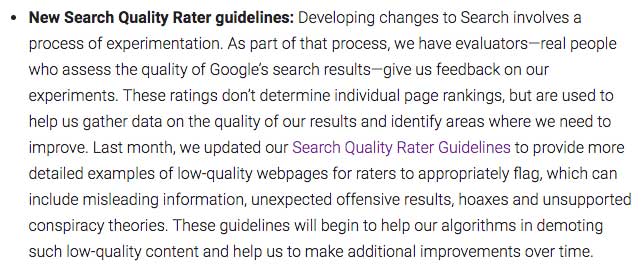
That last line sums up our thoughts well…”The guidelines will begin to help our algorithms in demoting such low quality content and help us to make additional improvements over time.” The QRG mention in many places that the raters are to consider content low quality if it contradicts scientific consensus. Again, Google has told us that if something is in the QRG, it reflects something they want their algorithms to do.
If you run a medical site that has had the MHC team do a site quality review, you should be hearing from your team contact soon with a whitepaper that will outline our detailed thoughts on the next steps that you can take. The paper will give very practical steps that you can take to make it so that your site is more trustworthy in the eyes of Google’s algorithms.
We do feel that Google will get better at determining what is trustworthy on a more granular level. We hope that they will eventually demote particular pages that are not helpful to searchers rather than entire sites as it appears to be the case now. We also hope that Google will make it easier for alternative medicine sites to rank for queries where it is clear that a user wants to see results that are not completely in line with what traditional medicine teaches.
About Marie
 Dr. Marie Haynes is recognized as a leader in the SEO industry and has 10+ years of experience helping businesses of all sizes improve their site quality. She is a frequent contributor to Moz.com and Search Engine Watch and a regular speaker at Pubcon and SMX. Marie was named one of the top five industry influencers by Rand Fishkin, founder of Moz, and constantly stays up to date with changes to Google’s algorithms to the benefit of her clients. To contact Marie, visit the contact page. For media Inquiries, click here.
Dr. Marie Haynes is recognized as a leader in the SEO industry and has 10+ years of experience helping businesses of all sizes improve their site quality. She is a frequent contributor to Moz.com and Search Engine Watch and a regular speaker at Pubcon and SMX. Marie was named one of the top five industry influencers by Rand Fishkin, founder of Moz, and constantly stays up to date with changes to Google’s algorithms to the benefit of her clients. To contact Marie, visit the contact page. For media Inquiries, click here.











